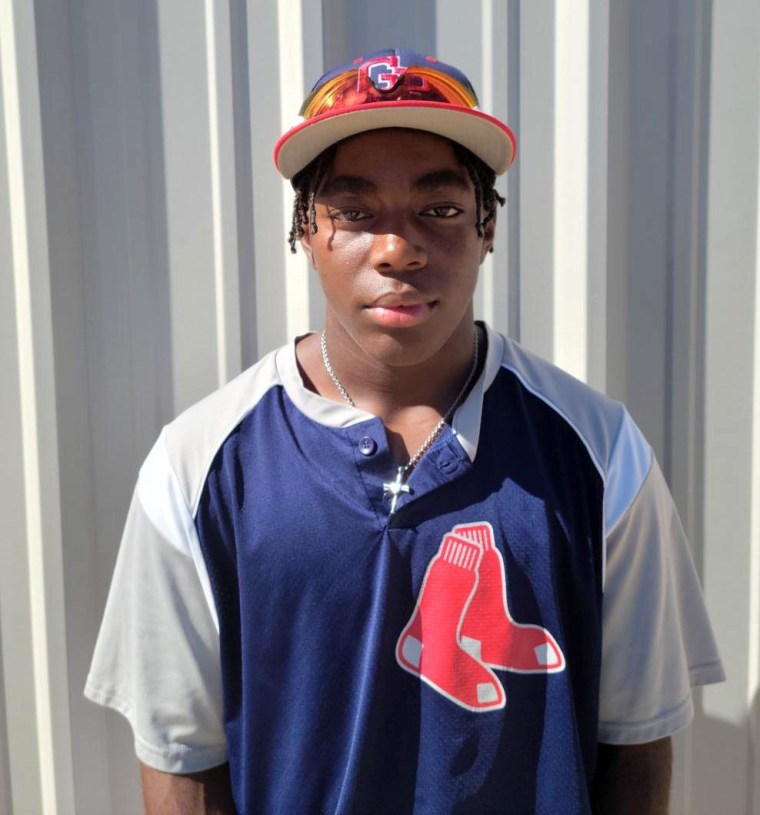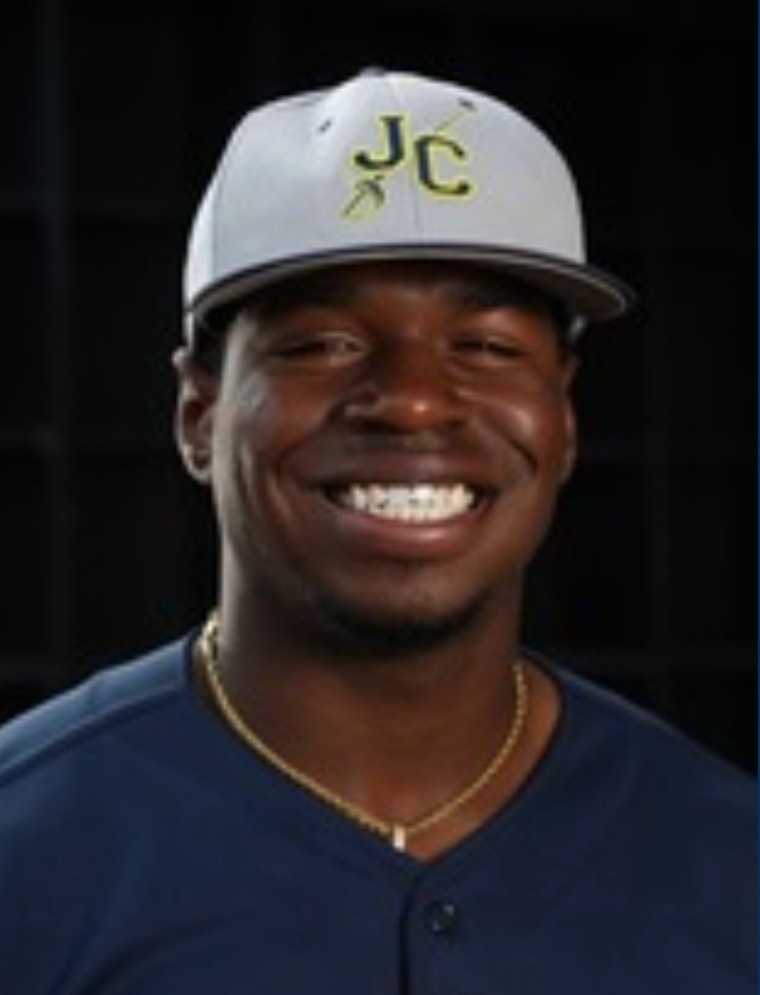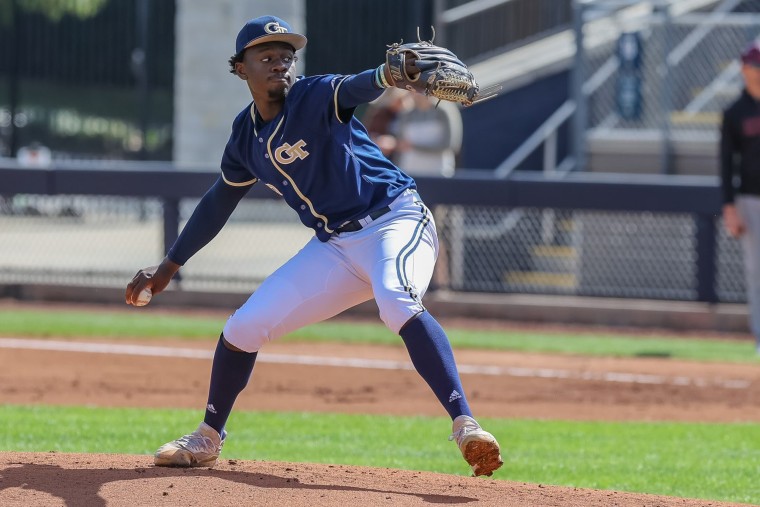When he was a kid, Marquis Grissom Jr. would sometimes shed tears in the car on the ride home from youth baseball games.
He cried because he heard “racist comments” from white opponents — players and especially parents, he said — as he competed on the field with an all-Black youth team in Atlanta.
“I would wonder: ‘Why do they hate me? I’m a good person,’” he recalled. “I didn’t know how to handle it at 11 years old.”
In the eight years since, Grissom — the son of a former Major League outfielder (for whom he is named) and now a sophomore pitcher for Georgia Tech — still occasionally hears the insensitive racial comments, he said. But they get drowned out by his unconquerable determination to make it to the major leagues.
As the World Series plays out this weekend between the Atlanta Braves and Houston Astros, the glaring lack of Black players on both teams, and MLB in general, is not lost on Grissom. The Braves and Astros each have one Black player on their World Series roster: Terrance Gore of Atlanta and Michael Brantley of Houston. Most MLB teams had two or fewer Black players, and three had none at the start of the season. About 50 percent of the league, meanwhile, is made up of Latin players.
A study released in August indicated Black players make up less than 8 percent of players in the major leagues, a telling number as baseball celebrated the 100th anniversary of the establishment of the Negro Leagues in 2021. In the 1970s, the percentage of Black players was more than double what it is today.
“I definitely notice there aren’t a lot of Black players right now,” Grissom Jr. said. “You can’t help but notice.”
Major League Baseball is making efforts to increase those numbers, including through its R.B.I. Program, which works to improve participation among underserved communities through youth leagues and programs; the MLB Breakthrough Series, which focuses on developing players through the highest level of instruction and competition in front of college coaches and pro scouts; and its 10-year commitment to supporting The Players Alliance, a social justice platform centered on improving the participation of Black athletes in baseball.
Still, the numbers are paltry, and the reasons are many, dating to Jackie Robinson integrating baseball in 1947, according to pop culture critic Gerald Early. In the years after Robinson broke the color barrier, players fled the Negro Leagues for the major leagues. And the Negro Leagues’ business structure “pretty much ended,” said Early, a professor of African American studies at the Washington University in St. Louis.
“And so, it was no longer an intrinsic part of Black culture anymore because Black people weren’t just playing,” Early added. “Black people were running it as a business; they owned the teams. Black people were coaches and Black people were general managers. So, all that went away, and I think it had an impact on Black people’s overall interest in the sport.”
Early said that after the 1970s, interest in baseball in Black communities nose-dived, leading to today’s concerns.
Three young Black baseball players — Grissom, high school star Colin Jones and junior college stalwart Mikal Ashley — chose baseball, and are on different paths and in different points in their journeys that they hope will land them in the major league.
But they have a common goal of wanting to be the change that inspires the next generation of young Black athletes to pursue America’s favorite pastime.
The road through college
“It’s on us, as young players, to make sure our community sees baseball as a cool sport and a sport our kids should play,” Grissom said. “MLB is trying, but we can’t leave it up to them. I feel like I have to get there and be a face and a voice that they can relate to and follow. That’s what can make a difference.”
Grissom began as a youth playing with all Black teammates — until college. He was part of his father’s Marquis Grissom Baseball Association, a league Grissom Sr. created in Atlanta in 2006 that has developed more than 2,000 Black youths in baseball. The player receives instruction and training from former major leaguers and plays travel ball against teams of elite players.
“We have to do like the Latin players do,” said Grissom Sr., who played for the Braves, Milwaukee Brewers and Los Angeles Dodgers in a 13-year career. “Pro players going to their countries and teaching the game, investing in their youths.”
His son is one of a half-dozen Black players on Georgia Tech’s 45-man roster.
“It’s different from what I was used to,” Grissom Jr. said. “It was great to play all my life with my guys, friends, who looked like me, had the same experiences as me. At Georgia Tech, though, it’s still great because we are a team of good guys. Playing in the city with the skyline behind you, man, it’s great, crazy. But I always know that I’m setting an example for the kids coming behind me. And that’s how we grow the game for Black kids. Play the right way. Set a good example. And do like my father has done and go back into the community and support and teach the game.”
On a fast track
Will Jones had been hesitant about sharing the baseball exploits of his son. Not anymore.
Colin Jones, 16, has ascended to become one of the top high school players in the country as a sophomore — a deft middle infielder who is effective at the plate and who is among the fastest high schoolers in America on the base paths.

“I’m not surprised by his success because he puts in the work to be great,” the dad said. “But I am surprised that he has this mission for someone so young.”
That mission is as much to change baseball as it is to be the No. 1 pick out of high school in the 2024 MLB Draft. “I can’t do it by myself, but I want to be a player who relates to young Black players and motivates them to put in the work in baseball,” Colin Jones said. “Right now, it’s not a game we overall want to play. I think it’s getting better, though, and if I can inspire others by going back and telling my story and showing them the way, then I would be doing my job. That’s important to me.”
He attends Georgia Premier Academy in Statesboro, Georgia, the only high school in the state that specializes in baseball. A B-plus student, he goes to class from 8 a.m. to noon and practices or plays baseball from 1 p.m. to 6 p.m.
“Every day,” he said. “And I’m fortunate because everyone can’t take this path. Baseball can be expensive and keeps some kids from playing. I’m just working hard to make the best of my situation so I can help others come into the sport. I don’t look at this journey as just for me.”
No Black teammates
Mikal Ashley pitches for Johnson County Community College in Overland, Kansas. He plays there because “my heart is into it and when your heart is in baseball, opportunities can develop no matter where you are,” he said.
Ashley, who can throw a fastball 94 miles an hour, went 6-0 last year with 47 strikeouts and 14 walks, and has drawn the attention of at least five colleges that want him to transfer after this season, like many of his teammates before him.

He is the only Black player on his team. But, he said, he is undeterred.
“Baseball is chess and checkers and I like that part of the game, the 14 minutes of nothing and then the two-minute spurts of awesomeness,” Ashley said. “It’s not for everybody. But I love it so much that being the only Black player doesn’t bother me. We’re teammates and those are my guys.
“But I would love to be a leader and show a ton of young Black players what baseball looks like. I can let them know what the journey is like. That’s how we can get the numbers up. I help other kids get into the game and they help the next generation. Maybe that sounds too simple, but I’m motivated by that idea.”

